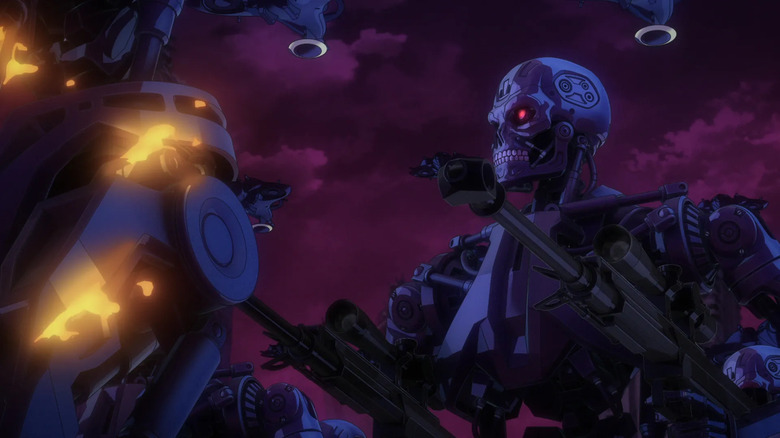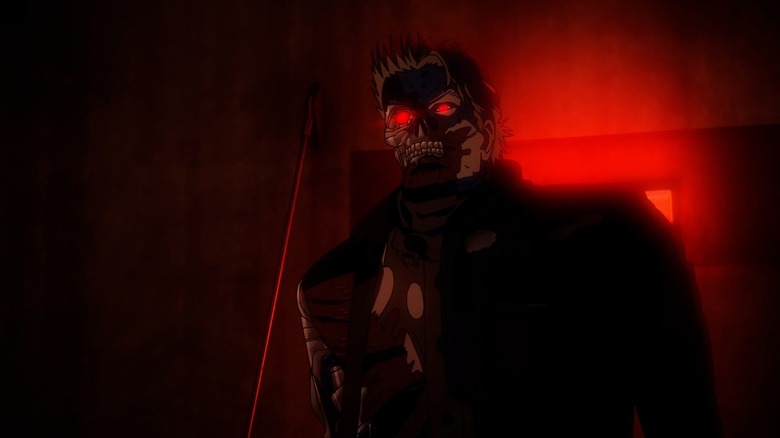When writer/director James Cameron and producer Gale Anne Hurd came up with “The Terminator” back in the early 1980s, they couldn’t have possibly predicted that their dystopian sci-fi future, where an artificial neural network-based conscious group mind and artificial general superintelligence system called Skynet would one day determine humans to be a threat and attempt to wipe them out, would one day feel within the realm of possibility. The questions constantly looming over the characters in the “Terminator” universe are ones of absolutes: Can humanity be saved from the threat of Skynet, and more importantly, are we deserving of such salvation?
According to “Terminator Zero” showrunner and writer Mattson Tomlin, this is at the heart of his new anime series for Netflix. As he told Tudum, “I’m not a nihilist — I’m a humanist, and I love people, and I think that there’s a reason that we’re on this planet.” He continued, “With something like ‘Terminator Zero’ where you have these big themes about technology and about an apocalypse that is truly driven and created by human beings and our need to invent, press, and push weaponry, it felt like the question to ask: Can we change our fate? We seem to be marching towards doom, and we know it.”
The new series is a gorgeous and gruesome departure from the John/Sarah Connor stories of the live-action films (read our review here), showcasing both 1997 ahead of Judgment Day and a war-torn 2022 after the robot uprising. Tokyo scientist Malcolm Lee (André Holland/Yuuya Uchida) is attempting to launch a counter, “good” AI program named Kokoro (Rosario Dawson/Atsumi Tanezaki) that will be Japan’s answer to Skynet, while resistance soldier Eiko (Sonoya Mizuno/Toa Yukinari) comes back in time to protect Malcolm from a Terminator sent to kill him.
But with the hindsight of how AI actually works today in 2024 rather than the educated guesses made by Cameron and Hurd in the 1980s, the stakes of “Terminator Zero” feel scarier than ever.
Terminators are scary because AI is scary
AI has become an unavoidable aspect of all of our lives. Job recruiters use AI to scan resumes looking for keywords without a human being ever reading it, health insurance companies have been busted using AI to approve or deny life-saving procedures, and this isn’t even taking into consideration how AI is being used more and more to manipulate our sense of reality with deepfakes, plagiarism, identity theft, and chatbots presenting straight up lies as fact. Back in 2016, Microsoft introduced a chatbot that would learn from Twitter/X users, and the bot was radicalized into spewing bigoted, Nazi beliefs in less than 24 hours. The company shut it down almost immediately after.
We are witnessing in real time how quickly AI, seemingly created with good intentions, can be corrupted, manipulated, and reflect back at us the absolute worst of humanity. As AI is continually incorporated into necessary facets of existence, the urgent need for those in positions of power to get a better handle on the technology and establish failsafe boundaries for ethical use only grows stronger. Setting “Terminator Zero” in 1997 with the knowledge of how AI will advance in the future makes the period setting even scarier because we’re getting invested in characters that will have to face the inevitable fate we know is coming their way. We know that Skynet is terrifying. We know that Terminators are dangerous. But watching Malcolm position Kokoro, an AI system, as the savior of the people is perhaps the scariest thing of all.
If the survival of humanity depends on artificial intelligence showing us mercy … we’ve already lost.
I spoke more about the show on today’s episode of the /Film Daily podcast, which you can listen to below:
You can subscribe to /Film Daily on Apple Podcasts, Overcast, Spotify, or wherever you get your podcasts, and send your feedback, questions, comments, concerns, and mailbag topics to us at bpearson@slashfilm.com. Please leave your name and general geographic location in case we mention your e-mail on the air.









